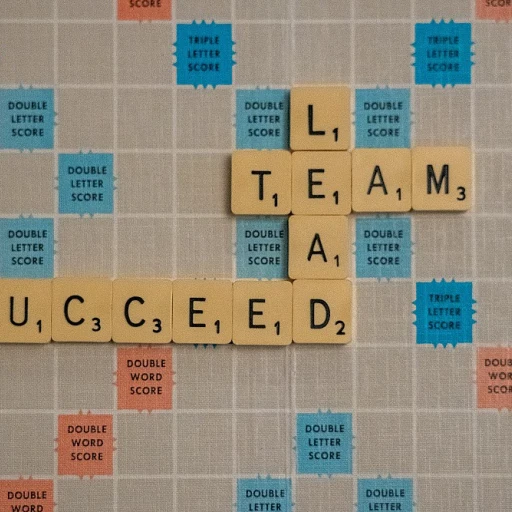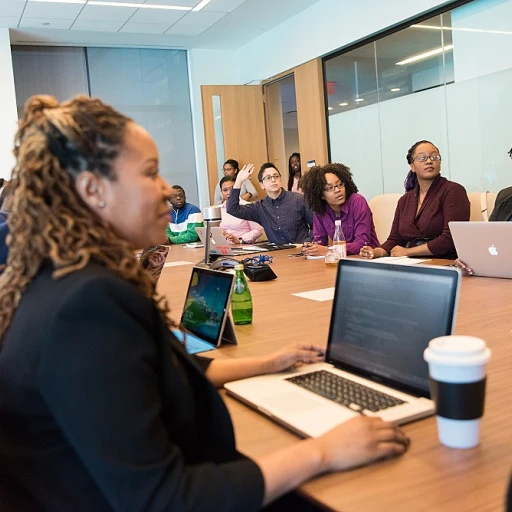Understanding the Role of a Mentor
The Significance of a Mentor in Professional Development
In the world of professional growth, a mentor plays a pivotal role. Mentors provide invaluable guidance, support, and experience-based insights that help mentees navigate the often complex terrains of their career paths. Whether you're a high school student interested in becoming a better reader or a professional seeking to climb the corporate ladder, the impact of a mentor cannot be overstated.
One of the key roles of a mentor is to offer personalized support. This might involve helping a student develop stronger literacy skills or guiding someone through the nuances of professional settings. In the context of reading proficiency, for example, a mentor can play a crucial role in fostering a love for reading by introducing diverse books and read-aloud sessions. Through such efforts, students reading abilities are significantly enhanced, encouraging them to become lifelong readers.
Moreover, the mentor-mentee relationship fosters an environment for skill-building. Mentees can enhance various competencies such as critical thinking, problem-solving, and communication—skills essential in any professional realm. For students, this relationship can bolster their educational journey, offering guidance in areas such as reading instruction and reading mentoring programs.
The professional mentoring realm extends beyond merely imparting knowledge. It encompasses the development of soft skills, such as empathy and patience, which are crucial in today’s diverse workplaces. This process often mirrors high-quality educational practices seen in schools, with mentors acting much like teachers in guiding their mentees toward successful outcomes.
Furthermore, professional mentoring programs support mentees by providing a structured path to achieve their career goals. These programs, much like reading mentor initiatives in high school settings, offer tailored advice that ensures individual growth. As you embark on your journey to find a mentor, remember the vast impact they can have on your career, from helping you overcome challenges to propelling you toward greater career achievements.
For more insights on professional mentoring and its potential impact, explore how to unlock this potential effectively at the
SLP Summit.
Building a Strong Mentor-Mentee Relationship
Fostering a Collaborative Environment
A crucial component of professional mentoring is establishing a collaborative environment between the mentor and the mentee. This setting allows for the development of a trusting relationship, essential for effective learning and growth. Mentors can use their experience to guide mentees, whether they're students in high school or individuals at different stages in their professional careers.
Building this relationship requires mutual respect and open communication. Here, both parties should feel comfortable expressing ideas and feedback without the fear of judgment. A mentor's support can significantly contribute to a mentee's literacy and reading skills by providing tailored resources and guidance, such as recommending books that match the mentee's interests or grade level.
Developing a Roadmap
Creating a roadmap is an integral aspect of the mentoring program, allowing mentors to tailor their approach based on the mentee's goals and needs. By assessing the mentee's current level, such as their reading proficiency or specific career aspirations, mentors can offer strategic support to enhance these skills.
Mentoring sessions should be structured yet flexible, incorporating diverse resources like diverse books and reading aloud sessions to cater to developing readers and promote a love for reading. This strategy is particularly effective in nurturing literacy skills among students reading at different levels, whether they're in third grade or high school.
Mentors should also focus on developing professional skills that align with their mentees' career trajectories, drawing from their own education and experiences. Providing tailored feedback and opportunities for the mentee to reflect on their growth are vital.
Commitment to Growth
Consistent commitment from both mentor and mentee enhances the effectiveness of the mentoring relationship. Mentors should strive to be accessible and attentive to the mentee's evolving needs, providing ongoing support and resources as necessary. In turn, mentees should actively participate, showing willingness to engage with the proposed activities and readings.
Building a strong mentor-mentee relationship facilitates personal and professional growth. Mentors, through their guidance and support, can inspire mentees to become proficient readers and capable professionals, which ultimately paves the way for a successful mentoring journey.
To dive deeper into how these relationships form the foundation of professional growth and development, see more on
mentoring as the foundation of professional growth and development.
Key Skills Gained Through Mentoring
Essential Competencies Acquired Through Mentoring
Professional mentoring can be an empowering experience for students and developing readers, unlocking a trove of skills that enhance both personal and professional growth. As mentors routinely emphasize the importance of literacy in their programs, these endeavors help students uncover a genuine love for reading, providing foundational skills that extend beyond traditional school instruction.
- Reading Proficiency and Literacy Skills: Through consistent engagement with reading mentors, students reading aloud together develop not just literacy skills but also a profound interest in diverse books. When mentoring programs focus on reading aloud, they elevate a student's ability to interpret and analyze text beyond their current grade level, fostering better comprehension and reading skills.
- Communication and Interpersonal Skills: Navigating the mentor-mentee relationship gifts students the opportunity to hone their communication skills. As developing readers, students learn how to articulate their thoughts and engage in meaningful discussions about their reading material, thereby improving their verbal and written communication abilities.
- Critical Thinking and Problem Solving: Mentoring is not just about improving reading proficiency—it’s also about developing critical thinking. By discussing books and various reading experiences, high school students are encouraged to challenge their perspectives and problem-solve, which are invaluable skills when transitioning into higher education or the workforce.
- Enhanced Educational Experience: With mentors acting as supportive guides, students experience an enhanced education journey. This high level of support pushes them to reach their potential, which can have lasting effects on their performance both in school and in future careers.
For those considering a mentor-mentee relationship, understanding the range of skills attainable underscores the immense value that professional mentoring can provide. To dive deeper into how virtual mentoring is broadening these opportunities, explore how
virtual professional mentoring is transforming the landscape. This embrace of digital literacy marks an evolution that aligns perfectly with the ever-evolving educational frameworks in schools today.
Overcoming Challenges in Mentoring
Facing Obstacles in the Mentoring Journey
Every mentoring experience presents its unique set of challenges, both for mentors and mentees. Navigating these obstacles can strengthen the bond and enhance the growth process in different environments such as high schools or professional settings.
- Communication Barriers: One primary hurdle in mentoring is establishing effective communication. Diverse backgrounds in education, reading proficiency, and cultural norms can affect how messages are received. Mentors must adapt their communication strategies, perhaps integrating methods like reading instruction or read aloud sessions, to establish clarity and understanding, especially with students reading at varying grade levels.
- Differing Expectations: Mentors and mentees may have differing objectives for the mentoring relationship. While some students might seek to develop specific literacy skills, others may look for broader educational support. Clarifying goals from the outset and revisiting them regularly helps in aligning interests and maintaining focus.
- Mismatched Pairings: Not every mentor-mentee match is ideal. Challenges arise when interests, such as a love for diverse books or specific subjects, are not shared. Revisiting the criteria used for pairing individuals in mentoring programs can ensure more compatible matches, thereby enhancing the educational experience.
- Time Constraints: Both mentors and mentees often face time limitations, especially within high-stress environments like schools or demanding job roles. Prioritizing and scheduling regular mentoring sessions can combat this issue effectively.
- Ensuring Continued Engagement: Sustaining interest over time can be challenging. Students with high reading skills may lose interest if not sufficiently stimulated. Programs must incorporate diverse materials and innovative approaches, such as aloud mentoring, to keep engagement levels high.
Understanding and proactively addressing these challenges not only fortifies the mentoring relationship but also contributes to the overall success of the program, ultimately benefiting the mentor, mentee, and their respective educational or professional environments.
The Impact of Mentoring on Career Advancement
The Ripple Effect of Mentoring on Career Progression
Professional mentoring is a powerful catalyst for career advancement, offering a wealth of knowledge and experience that empowers individuals to reach new heights in their professional journey. Through mentoring, learners gain crucial insight into the industry, cultivate essential skills, and develop the confidence needed to take significant strides in their careers. Here are some key impacts that mentoring can have on career advancement:
- Skill Enhancement: Mentoring programs support the development of both technical and soft skills, which are crucial in any profession. Mentees have the opportunity to improve literacy skills through reading mentoring, which not only enhances their ability to grasp complex information but also boosts their proficiency in communication.
- Increased Confidence: The guidance of a mentor offers the affirmations and constructive feedback necessary to build self-assurance. As students and developing readers become more confident in their abilities, they find it easier to navigate challenges and seize opportunities.
- Network Expansion: Mentors often introduce mentees to their professional network, opening doors to new opportunities and potential collaborations. This expanded network can be pivotal in career advancement, providing connections that might otherwise be inaccessible.
- Informed Decision Making: Mentors provide insights into industry trends, best practices, and the nuances of navigating complex career paths. This knowledge empowers mentees to make informed decisions, aligning their career goals with market demands.
- Cultivating Interest and Passion: Through exposure to diverse books and reading programs, mentees are encouraged to explore different fields, sparking a love for learning and a genuine interest in their chosen career paths. This passion can be a significant motivator, driving continued growth and advancement.
Effective mentoring also involves navigating and overcoming challenges, fostering a supportive mentor-mentee relationship, and seeking tailored guidance to maximize one's potential. This journey, while not without its hurdles, ultimately fosters professional growth and sets the stage for meaningful career advancement.
Finding the Right Mentor for You
Seeking the Ideal Guide on Your Professional Journey
Navigating the professional landscape can often feel overwhelming for students and early career professionals. Identifying the right mentor can serve as a cornerstone in this journey, offering guidance and support to those seeking to enhance their reading and literacy skills. Through powerful mentor-mentee relationships, one can cultivate not only professional expertise but also a deeper love for reading and continuous learning.
Finding the right mentor begins with understanding the specific areas in which you seek growth. Are you striving to develop your leadership skills, improve your ability to engage with diverse books, or are you intent on nurturing budding readers in a high school setting? Clarifying these goals can guide you toward a mentor who aligns with your aspirations and professional path.
Consider looking into programs and initiatives that focus on specific aspects of literacy and professional development. Engaging with a reading mentoring program, for instance, can bolster your confidence and skill set if you are inclined toward education, particularly in schools or student-focused environments. These programs not only promote reading proficiency among developing readers but also prepare mentors to address varied literacy needs effectively.
Potential mentors could include teachers or high-level professionals who have considerable experience and a proven track record in the field you are interested in. Their firsthand experience with education and young students can offer insights on improving both literacy skills and career readiness, particularly for those aspiring to work in school environments. Involvement in programs that encourage reading aloud mentoring can also be beneficial, as they provide practical experience while fostering a supportive learning environment.
A thoughtful approach to selecting a mentor can greatly impact your career advancement, as discussed earlier. With the right support, whether it be through enhanced reading skills or exposure to diverse educational strategies, a mentor can be integral in helping one achieve professional objectives. Connecting with mentors who inspire a passion for development can facilitate a shift from a simple interest in reading to a profound commitment to lifelong learning and professional excellence.














